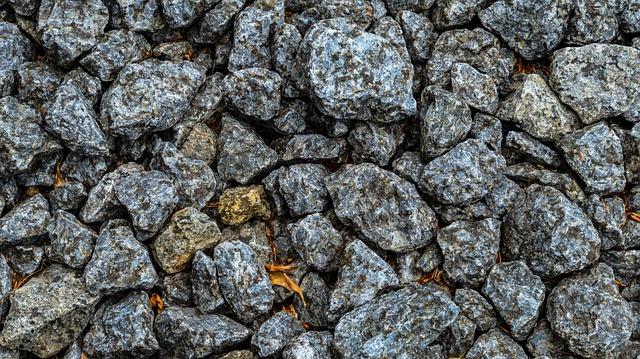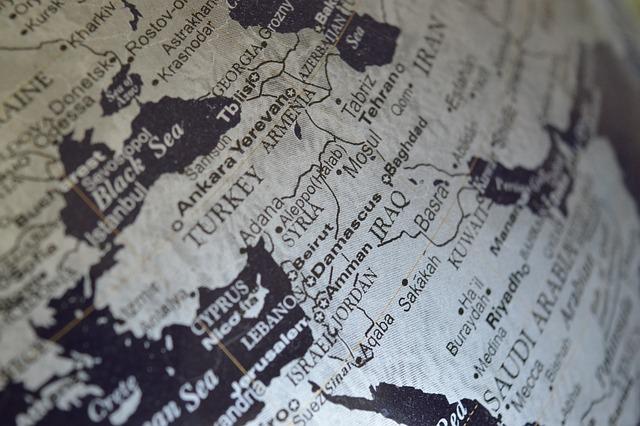In an era marked by intensified global competition for resources, Africa’s critical mineral wealth has emerged as a focal point of geopolitical interest and strategic maneuvering.A recent technical roundtable hosted by teh International Institute for Democracy and Electoral Assistance (International IDEA) brought together experts, policymakers, and industry leaders to explore the complex interplay between Africa’s abundant mineral resources and the shifting dynamics of global power. As countries around the world seek to secure access to essential materials for green technologies and digital economies—such as lithium, cobalt, and rare earth elements—the implications for African nations, their governance, and their role on the world stage are profound. This article delves into the insights shared during the roundtable discussions, highlighting the challenges and opportunities that lie at the intersection of geopolitics and resource management in Africa.
The Global Race for Africa’s Critical Minerals and Its Implications
The scramble for Africa’s abundant critical minerals is intensifying, as nations and corporations vie for access to resources essential for modern technologies and renewable energy solutions. This race is marked by a variety of actors, including established powers, emerging players, and non-state entities, each seeking to secure their interests in a continent that harbors over 30% of the world’s mineral resources. The implications of this competition extend beyond mere economic gain; they also have significant political and social ramifications. Some key factors influencing this dynamic include:
- Resource Nationalism: Many African nations are pushing for policies that favor local ownership and value addition, challenging conventional exploitative practices.
- Geopolitical Tensions: The involvement of global superpowers seeking strategic advantages can lead to increased tensions, as nations align themselves with different actors.
- Environmental Concerns: The extraction of minerals raises pressing environmental issues, prompting debates on sustainable practices and corporate accountability.
In the context of these developments, understanding the geopolitical landscape of Africa’s critical minerals is imperative.An insightful analysis of stakeholders involved reveals a complex matrix of partnerships and rivalries. The following table illustrates some of the primary players in this arena, alongside their respective interests:
| Country/Organization | Interest in Africa’s Minerals | Key Actions |
|---|---|---|
| China | Access to strategic minerals | Investment in mining infrastructure |
| United States | Countering Chinese influence | Diplomatic partnerships and aid |
| European Union | Securing green technology materials | Supporting sustainable mining initiatives |
| African union | Promoting integration and regional policies | Facilitating intra-African trade agreements |
Understanding the Geopolitical Stakes in Africa’s Resource Wealth
Africa’s vast reserves of critical minerals such as lithium, cobalt, and rare earth elements are pivotal in a global transition towards sustainable energy and advanced technology. The competition for these resources is not merely a race for economic gain; it encompasses a complex web of geopolitical dynamics. Nations across the globe—especially in the West and East Asia—are increasingly attentive to Africa’s mineral wealth, reflecting on the strategic importance these resources hold in energy security, technological advancement, and infrastructure development. The role of local governance, international partnerships, and multinational corporations complicates this landscape further, as various stakeholders exert influence over mining operations and benefit-sharing agreements.
In this multifaceted scenario, several key factors must be considered:
- National Sovereignty: African nations are seeking to reclaim control over their resources, negotiating terms that favor local communities and governments.
- Global Demand: The rising demand for electric vehicles and renewable energy solutions increases pressure on African countries to exploit these resources rapidly.
- Environmental Concerns: The push for extraction frequently enough raises questions about sustainability and environmental degradation, prompting calls for responsible mining practices.
| Resource | primary Producers | Current Global Demand |
|---|---|---|
| Lithium | Zimbabwe, Namibia | High – EV batteries |
| Cobalt | Democratic Republic of Congo | Very High – Tech gadgets |
| Rare Earth Elements | South Africa, Malawi | Growing – Electronics, renewables |
A Spotlight on Sustainable mining Practices and Environmental Concerns
The conversation surrounding Africa’s critical mineral resources is incomplete without addressing the essential need for sustainable mining practices. As countries across the continent ramp up their extraction activities to meet global demand,it is crucial to adopt methods that minimize environmental degradation. Responsible mining operates under principles such as biodiversity preservation, water management, and waste reduction. By embracing innovative technologies and sustainable practices, companies can considerably reduce their ecological footprint while still meeting production targets. For instance, integrating practices like reclamation of mining sites and use of option energy sources can ensure that mining operations do not come at the expense of natural habitats.
Moreover, the role of local communities in sustainable mining practices cannot be overstated. Engaging indigenous populations and local stakeholders in decision-making processes helps align mining activities with the needs and rights of these communities. This cooperative approach fosters a sense of ownership and accountability, leading to practices that benefit both the environment and the economy. Key focus areas include:
- Participatory Environmental Monitoring: Involving local communities in monitoring the environmental impacts of mining activities.
- Education and Training: Providing training programs for sustainable mining practices for local workforce.
- revenue Sharing Models: Ensuring that a portion of mining revenues benefits local communities to promote social equity.
| Practice | Impact |
|---|---|
| Sustainable Water Management | Reduces contamination and preserves local water sources |
| restoration of Habitats | Supports biodiversity and ecosystem recovery post-mining |
| Use of Renewable Energy | Lowers carbon emissions and reliance on fossil fuels |
Strengthening Governance Frameworks to Counter resource Exploitation
To effectively combat resource exploitation in the context of Africa’s critical minerals, it is imperative to establish a multifaceted governance framework that supports both local communities and national interests. This framework should encompass a range of strategies aimed at enhancing transparency, accountability, and sustainable practices within the extractive sector.Key components include:
- Strengthening regulatory bodies: Enhancing the capacity and independence of agencies responsible for resource management.
- Community engagement: involving local populations in decision-making processes related to resource extraction.
- International collaboration: promoting partnerships between governments, NGOs, and international organizations to share best practices and resources.
Moreover,leveraging technology can play a pivotal role in modernizing governance frameworks. Advanced data systems and blockchain technology can provide the transparency needed to track mineral resources from extraction to market. Implementing these technologies can definitely help mitigate corruption and ensure that the benefits of resource exploitation are equitably distributed. A comparative perspective is reflected in the following table, highlighting accomplished governance practices from various African nations:
| Country | Governance Practice | Impact |
|---|---|---|
| Rwanda | Community co-management of mining sites | Improved local livelihoods and reduced conflict |
| Ghana | Implementation of obvious revenue-sharing models | Increased government accountability and public trust |
| South Africa | Use of technology for monitoring mineral distribution | Enhanced tracking and reduced illegal mining |
Fostering International Cooperation for Fair Trade Agreements
In an increasingly interconnected world, the need for collaborative efforts among nations is paramount, especially when it comes to the equitable distribution of Africa’s critical mineral resources. These minerals are vital for the global economy, powering advancements in technology and renewable energy. By fostering inclusive partnerships, governments and stakeholders can navigate the complexities of supply chains, ensuring that trade agreements benefit not only the exporting nations but also the international community as a whole. Key initiatives to promote cooperation include:
- Joint Ventures: Establishing collaborative projects between African nations and foreign investors to enhance mining practices.
- Capacity Building: providing training and resources to local communities to increase their participation in the trade processes.
- Transparent Policies: Advocating for clear regulations that prevent exploitation and promote fair pricing.
Furthermore, it is essential that international organizations play a role in mediating negotiations that prioritize sustainable practices and equitable resource distribution. The establishment of a robust framework for dialog can pave the way for comprehensive trade agreements that recognize the interdependence of economies. Countries can also benefit from sharing knowledge and best practices regarding environmental protections, labor rights, and technological innovations in mineral extraction. A coordinated approach involving:
| Strategy | Benefit |
|---|---|
| Multi-National Agreements | Encourages resource sharing and joint efficiencies. |
| regional Collaboration | Strengthens regional security and reduces conflict over resources. |
| Technological Partnership | Enhances innovative practices in extraction and processing. |
Empowering Local Communities: Ensuring Inclusive Economic Benefits
The integration of local communities into the economic framework surrounding Africa’s critical mineral resources is paramount for achieving sustainable development. Inclusive strategies must be prioritized to ensure that these communities not only benefit from the exploitation of their natural resources but also have a stake in decision-making processes. Local populations should be engaged through initiatives that promote capacity building and skill development, enabling them to participate actively in the mineral supply chain. Here are a few ways to achieve this goal:
- Local Hiring Practices: Encourage mining companies to prioritize local employment and training programs.
- Community Investment: Implement mandatory CSR initiatives that directly invest in local health, education, and infrastructure.
- Transparent Revenue Sharing: Ensure clear frameworks for sharing mineral revenue with local governments and communities.
Moreover, fostering partnerships between governments, NGOs, and the private sector can enhance the economic landscape for local stakeholders.Collaborative frameworks can facilitate the sharing of best practices and resources to maximize the benefits of critical mineral extraction. To visualize the impact of these strategies, consider the following table, which outlines potential economic benefits for local communities:
| Economic Benefit | Description |
|---|---|
| Job Creation | As mining operations expand, local employment opportunities increase, providing income to families. |
| Infrastructure Development | Revenue generated can fund essential services such as roads,schools,and health clinics. |
| Entrepreneurship Opportunities | Local businesses can thrive through contracts and services provided to mining companies. |
Closing Remarks
the technical roundtable on the geopolitics of Africa’s critical mineral resources hosted by International IDEA shed light on the complex interplay of economic interests, local governance, and international relations shaping the continent’s future. as global demand for critical minerals escalates,the implications for African nations are profound,from potential economic boom to vulnerability to foreign exploitation. The discussions underscored the necessity for sustainable policies that empower local communities and promote transparent partnerships. As stakeholders look ahead, the insights gained from this roundtable will be instrumental in navigating the intricate landscape of resource management, ensuring that Africa can leverage its mineral wealth for the benefit of its people while maintaining its sovereignty in an increasingly competitive global arena. The path forward requires collaboration, strategic foresight, and a commitment to equitable resource distribution, ensuring that Africa’s rich mineral endowments translate into lasting developmental gains.

